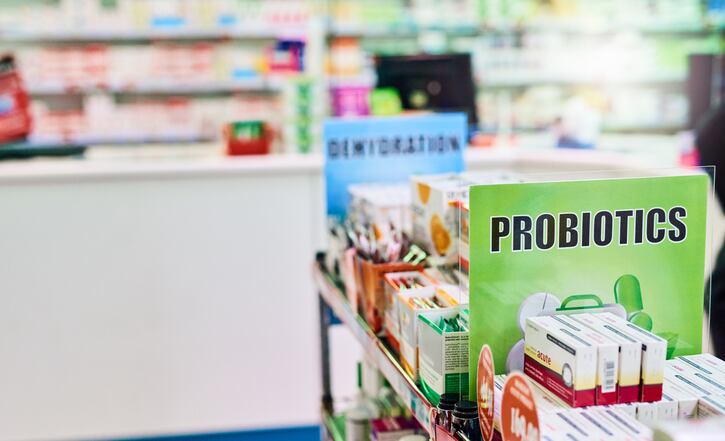Red ginseng and probiotics were respectively the first and second bestselling health functional foods in South Korea as of year 2020, according to the country's Ministry of Food and Drug Safety (MFDS).
“The volume of probiotics sold in the market is slightly lower than the vitamin and mineral products, but the profit coming from the sales of probiotics is much higher than vitamins and minerals.
“Our forecast is that the sales volume of probiotics will surpass that of vitamins and minerals within this year or next year,” Woonjin Lee, senior manager, overseas team 1 at Cell Biotech – the company behind probiotic brand Duolac told NutraIngredients-Asia.
For the company, its best-selling products are Daily Vitality for maintenance of a healthy gut, Duo D-drops for maintaining a balanced intestinal microflora in infants, and Duolac Daily Kids.
Most consumers learned about probiotics from social networking services (SNS) sites, especially for young consumers, Lee said.

AceBiome, another South Korean probiotic company, agrees.
“The reasons for the success of probiotics in Korea can be attributed to consumers’ growing scientific awareness and demand for a healthier lifestyle.
“They learn about the benefits of probiotics and balanced microbiome through media, TV health programs, commercials, and SNS (social networking service) ,” CEO Myeong Hee Kim told us.
The company is behind the weight management probiotics BNRThin and menopausal relief BNR Queen. It is also going to launch a probiotic for immune health known as AB-Immune next month.
The country’s probiotic market growth is also driven by the likes of Lacto-Fit by Chong Dun Kang, Esther Formula’s Ultra Flora Probiotics, CJ Cheiljedang’s Byo, and IIdong Pharmaceutical’s GQ Lab, according to data from market research platform Lumina Intelligence.
“The market leader by far is blockbuster brand, Lacto-Fit by Chong Dun Kang. Lacto-Fit’s sales skyrocketed between 2016-2020, increasing by 14.5 times, from KRW18 billion in 2016 to KRW265 billion in 2020,” said Ewa Hudson, director of insights at Lumina Intelligence.
She added that the company was successful because it changed the way probiotic supplements were sold.
Aside from pharmacies, the brand is distributing its products in hypermarkets, department stores, drugstores and duty-free shops, as well as leading online marketplaces such as Coupang, Gmarket and its own brand website.

Companies from other industries are also dabbling in the probiotic space.
Skincare and cosmetic giant Amorepacific for instance, has launched a green tea-based probiotic known as Greentea Biotics under the brand VITALBEAUTIE.
The product contains green tea derived probiotic Lactobacillus GTB1, which was developed by the company’s Green Tea Probiotics Research Center.
“Existing probiotics products are focused on intestinal health effects such as smooth bowel movements, proliferation of beneficial bacteria and suppression of harmful bacteria.
“However, more recent research has enabled probiotics products to support additional functions including skin health,” said Vital Beautie’s Inok Hwang.
Hwang added that much of the product purchase took place online.
“We see much of the information exchange and actual purchases happening online. In addition to typical social commerce channels, purchases are active at home shopping channels and department store online malls.”
Reasons for growth
The probiotics category has outpaced the VMS industry because of two main reasons: 1) a higher product margin from the sales of probiotics and 2) consumers’ perception of probiotics as being more effective than vitamins and minerals, according to Lee.
First, he pointed out that the vitamin and mineral category was highly competitive, and brands have sought to attract consumers through deep discounts, which was damaging to profit margin.
As such, retailers have been exploring new products with promising benefits, and probiotics, which commands a higher margin, has become one of their options.
“These days, the Korean customers do not choose a supplement product because it is cheap, but because they really want to buy good products with real effects,” Lee said.
Second, he said that as compared to vitamins and minerals, consumers were also under the impression that probiotics could offer more benefits.

Hudson is of the same view, highlighting that probiotics products these days are designed for specific demographics and provide distinct health benefits.
She pointed out that the most consumers purchased probiotics for strengthening their immunity, while general health, digestive health, skin care and slimming were the other common reasons.
Citing the case of Lacto-Fit, she said that the brand itself has 14 brand variants, such as Lacto-Fit Gold for general health, Lacto-Fit Beauty for skin health, and even a product for helping students with gut health and providing stress relief when they are studying for exams.
The product, known as Lacto-Fit Pass, contains vitamin B and theanine as well.
Hwang, on the other hand, said that the ageing population has led consumers to seek products that promote healthy ageing. This has in turn led to the growth of the probiotic sector.
COVID-19
The ongoing COVID-19 pandemic is another contributing factor driving probiotic boom in Korea.
“In 2021, demand was directly impacted by COVID-19. Probiotics are known to strengthen immunity, and as such, there was a wave of demand for probiotics as a means of health protection/immunity during the pandemic.
“A similar trend was also seen in 2015, when Korea’s health functional food market grew by approximately 15 per cent as a direct result of the MERS crisis,” Hudson said.

Against the backdrop, Lee said that the global probiotics market was expected to grow seven to eight per cent annually.
Kim expects consumers’ rising interest in probiotics to continue, as both the ageing population and younger generations become more health conscious.
Improving consumer understanding
Despite the boom in probiotic sales, the companies believe that there is a need to improve consumers’ understanding of probiotics.
“We observed that most consumers buying probiotics do not really understand what probiotics are, and they only have a very basic understanding of what probiotics does, such as benefits for digestive health and immune defence.
“This is also the reason why our top-selling products are those that target general gut health. However, research has shown that probiotics can do much more,” Lee said.
Kim agrees, telling us that consumers tend to think that every probiotic product is similar in composition and functions.
“People tend to think that every probiotic product is the same. However, each probiotic strain is a live bacterium with a different, scientifically proven function that it carries in the body.
“So, a probiotic product may help reduce body fat, another enhances women’s health or strengthens immunity, or it may just provide intestinal health benefits, which is a common feature of probiotics.”

Another widely held myth is that multi-strain probiotic products are always better than single-strain products, according to Kim.
“In fact, one of the bestselling probiotic products in the world for decades has been a single-strain product, Lactobacillus rhamnosus GG (LGG), which is known as the most studied strain in the world.”
She highlighted that her company’s BNRThin, a bestselling item, was also a single-strain probiotic product containing Lactobacillus gasseri BNR17.
“While single strain probiotic products can deliver specific desired effects, multi-strains products can provide complementary features. It is important that different strains are tested in combination to ensure the product’s efficacy that these strains work well together,” she said.
Future directions
Moving forward, the probiotics sector in South Korea would advance towards more premium offerings and even into the therapeutic space.
“Another direction the probiotics industry may take is in the therapeutic space. There is abundant research associated with microbiome and human health that establish the potential for microbiome drugs”, Kim said.

She expects that research on the gut-lung axis and gut-brain axis will continue to influence the domestic and global probiotic industry.
“The traditional probiotic market for gastrointestinal health will continue to grow along with the premium probiotic market in Korea.
“The competition in this generic sector has been fierce but it is expected to grow since the market demand is there.”



